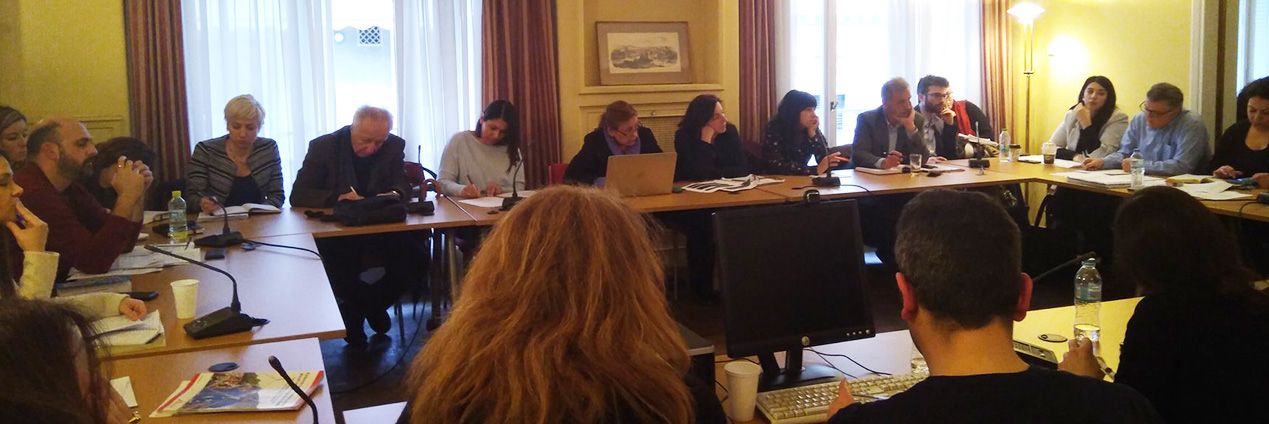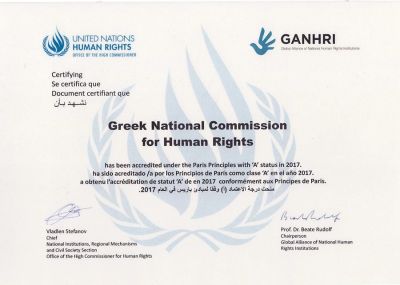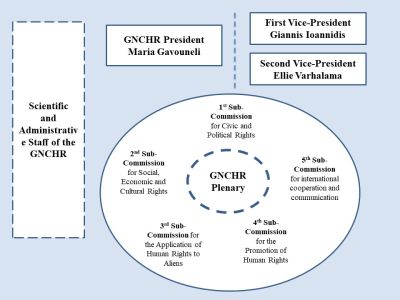
GNCHR, the independent advisory body to the Greek State in human rights issues
Legal Framework
The Greek National Commission for Human Rights (GNCHR) was established by Law 2667/1998 as the independent advisory body to the Greek State in accordance with the UN Paris Principles, adopted by the United Nations (General Assembly Resolution A/RES/48/134, 20.12.1993, “National institutions for the promotion and protection of human rights”) and is the national institution for the protection and promotion of human rights (NHRI) in Greece.
The founding legislation of GNCHR was amended by Law 4780/2021, the provisions of which now govern the operation of the National Commission.
The creation of the GNCHR emanated from the need to constantly monitor developments regarding human rights protection on the domestic and international plane, to inform Greek public opinion about human rights-related issues and, above all, to provide guidelines to the Greek State aimed at the establishment of a modern, principled policy of human rights protection. The GNCHR aims to constantly urge state bodies for the need of the effective guarantee of human rights for every person living in Greece.
The GNCHR plays an important and constructive role in the effective implementation of human rights protection, constantly monitoring developments related to the human rights situation in Greece and abroad and the implementation of human rights law, providing ongoing advisory to the competent bodies of the State.
Its advisory role, however, is not limited to submitting opinions, recommendations, proposals or reports and participating in Parliamentary sessions but also extends to assisting the reports submitted by national competent authorities for their compliance with international, regional and / or and European human rights standards (reporting) as well as encouraging the ratification of international human rights treaties.
The independence of the GNCHR, through the dual mandate for the promotion and protection of human rights entrusted to it by the legislator, is guaranteed by its law and ensured, inter alia, by providing for a mandate as broad and clear as possible in the legislation.
GNCHR legislation clearly defines its mission and sphere of competence, while GNCHR interprets the mandate in a broad and constructive manner, in order to promote a more progressive definition of human rights that includes all human rights, as these are defined in international, regional and national texts and are interpreted by the competent international judicial and quasi-judicial bodies. In this way the fundamental principle of human rights law is realized, according to which all rights are universal, indivisible and interdependent.
An additional guarantee of GNCHR’s independence is its pluralistic and polyphonic composition with the participation of 20 bodies, which allows and cultivates a unique dialogue between the various bodies of Civil Society and the State. Reflecting the pluralism of views on human rights issues, this collective composition, which includes, among others, independent authorities, universities of law and political science, trade unions, NGOs, political parties and ministries, provides a very high level of expertise. very close to the needs and challenges of the field.
In the context of its institutional role and mission as guardian of human rights at international, regional and national levels, the GNCHR plays a central role in bridging the gap not only between the State and Civil Society, but also between the Country’s international commitments for the implementation of human rights and their real enjoyment in practice.
According to its law, the main mission of GNCHR consists of:
- The constant monitoring of developments regarding human rights protection, the continuous briefing and promotion of the relevant research.
- The maintenance of permanent contacts and co-operation with international organizations, such as the United Nations Organisation, the Council of Europe, the OSCE, with National Human Rights Institutions of other States, as well as with national or international non-governmental organisations.
- The formulation of policy advice of human rights issues.
The GNCHR has been accredited, since 2001, A status (full compliance), by the competent GANHRI Sub – Committee on Accreditation (SCA) under the auspices and in collaboration with the Office of the High Commissioner for Human Rights (OHCHR). The National Human Rights Institutions (NHRIs) are regularly evaluated in a series of demanding procedures. In March 2017, the GNCHR was re-accredited A status by SCA, a fact proving the fulfilment of it's mission to promote and protect human rights.


